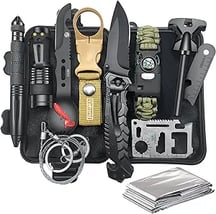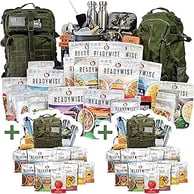The Enchanted Hunt Adventure: Ultimate Guide to Fortifying Your Home in SHTF
Join the Enchanted Hunt Adventure! Discover powerful home defense strategies for SHTF scenarios and learn how to fortify your home and protect loved ones in a crisis.
SURVIVAL
As an Amazon Associate, I earn from qualifying purchases. This means I may earn a commission if you click on an affiliate link and make a purchase, at no extra cost to you.




JIHPEN sword,Michonne's Katana The Walking Dead - 40.5in


VEITORLD Gifts for Men Dad Him Christmas, Survival Gear and Equipment 12 in 1, Survival Kits, Cool Unique Fishing Hunting Birthday Gift for Husband Teen Boy Boyfriend Women, Stocking Stuffers for Men


Family Comfort 72 Emergency Survival Kit/Backpack – 72 Hour for 2 People – Disaster Preparedness – Delicious ReadyWise Food, Gear, Lighting, First Aid, Tools & More - Sirius Survival
1. Understand the Threat: Mindset of Looters and Marauders
Understanding the mindset of those who may attempt to breach your home is the first step in effective defense. Looters often act out of desperation, while organized marauders may have more calculated intentions. Recognizing this allows you to employ strategies that enhance your operational security (OpSec):
Trust No One: Keep your plans, supplies, weapons, water, and who is staying with you strictly confidential. The more people know about your resources, the more vulnerable you become.
Avoid Attracting Attention: If people know women are in the house, it can attract unwanted attention from those with ill intentions. Stay vigilant and discreet.
Act Like You’re Struggling: Blending in with those around you is crucial. Avoid wearing clean clothing when others are dirty, as looking healthy and well-fed can make you a target.
2. Reinforce Your Home's Security
Physical barriers are your first line of defense against unwanted entry. Here’s how to effectively reinforce your home:
Strengthen Entry Points: Use heavy-duty deadbolts and security bars on doors and windows. Consider installing shatter-resistant glass or window security film to thwart easy access.
Create the Illusion of Vulnerability: Make your home appear looted and empty to deter intruders. This psychological tactic can make looters think they’ve chosen the wrong target.
Utilize Sandbags and Barbed Wire: Set up sandbags as barricades and use barbed wire to deter unwanted entry. These measures can enhance the physical defenses of your home.
3. Camouflage Your Supplies
To prevent looters from discovering your resources, consider these tactics:
Bury Cache Supplies: Bury caches of food and other essential supplies in different locations around your property to ensure that not all resources are in one place.
Blend In: If everyone around you appears to be struggling, you should too. Avoid wearing clean clothing when others are dirty, as looking healthy and well-fed can make you a target.
Act as Though You’re Struggling: Present yourself as if you’re experiencing the same hardships as those around you. This can help you blend in and avoid drawing attention to your home.
4. Create a Safe Room: Your Sanctuary in Crisis
In extreme situations, having a designated safe room can provide sanctuary:
Select a Suitable Space: Choose a central room that is easily barricaded and away from windows. Reinforce the door with additional locks or security bars.
Stock Essential Supplies: Equip your safe room with non-perishable food, water, a first-aid kit, flashlights, batteries, and a means of communication.
Stay Informed: Keep a battery-operated radio to stay updated on emergency broadcasts and local news.
5. Develop a Comprehensive Defense Plan
A well-thought-out defense plan can make all the difference:
Assign Roles: If you live with family or roommates, assign specific roles based on skills. For instance, one person could monitor external threats while others secure the home.
Conduct Practice Drills: Regular drills ensure everyone knows their role in an emergency, leading to a quicker and more effective response.
Evaluate and Adapt: After each drill, gather feedback to refine your plan. Situations change, and your strategies should evolve accordingly.
6. Implement Noise and Light Discipline
Keeping a low profile is crucial in deterring looters:
Minimize Outdoor Lighting: Use blackout curtains and limit outdoor lights during nighttime. This prevents attracting attention from unwanted visitors.
Maintain Silence: Stay as quiet as possible; noise and lights attract looters. Avoid unnecessary sounds that could alert others to your presence.
7. Arm Yourself Responsibly
If you choose to defend your home with weapons, do so with caution and knowledge:
Know the Laws: Familiarize yourself with local self-defense laws and regulations to understand your rights and responsibilities.
Invest in Training: Proficiency with firearms is critical for effective self-defense. Regular training will prepare you for high-stress situations.
Consider Non-Lethal Options: Equip yourself with tools like pepper spray or stun guns as alternatives for self-defense when lethal force isn’t necessary.
8. The Value of a Trusted Knife: Versatility in Survival
A quality knife is an indispensable tool in any survival situation, offering versatility in various tasks:
Everyday Utility: Use it for food preparation, making kindling, or repairing gear. A reliable knife can perform countless functions in a pinch.
Fire Starting: Use a ferro rod to create sparks with the spine of your knife, enabling you to start a fire—essential for warmth, cooking, and signaling for help.
Self-Defense: In emergencies, a knife can provide a means of protection when firearms aren’t available. It’s lightweight, easy to carry, and can serve as a deterrent against threats.
9. Build a Community Defense Network
Strength in numbers is crucial during crises:
Establish a Neighborhood Watch: Create a network of trusted neighbors who can share information about suspicious activities and collaborate on security measures.
Support Each Other: During a crisis, having a community looking out for one another can greatly enhance safety and resource sharing.
10. Use Dogs as Deterrents
Dogs can be invaluable in-home defense:
Psychological Deterrents: Dogs serve as both alarm systems and deterrents. Their presence alone can discourage intruders, as they can alert you to any disturbances.
Training for Defense: Consider training your dog for protection to enhance your home security. A well-trained dog can provide an additional layer of defense.
Conclusion
In a SHTF scenario, your home’s safety is non-negotiable. By reinforcing your defenses, developing a comprehensive plan, and building a supportive community, you can significantly enhance your preparedness against looters, thieves, and marauders. Remember, the best defense combines physical security, situational awareness, and community collaboration.
For even more survival strategies, check out this comprehensive video on fortifying your home during societal collapse: Survival Tactics Video.
Stay vigilant, stay safe, and make sure your home is prepared to withstand any threat!
Liked this article? You might also find value in our guide on Ultimate Survival Skills and Emergency Preparedness:
https://warhammerblades.com/ultimate-survival-skills-emergency-preparedness-self-defense


